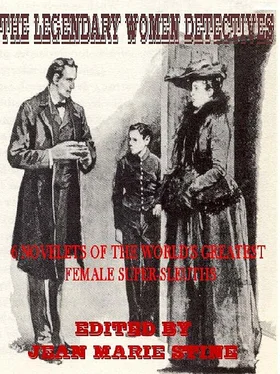“I read it all in another light, you see,” said Loveday. “I seemed to me that the mother, knowing her son’s evil proclivities, believed in his guilt, in spite, possibly, of his assertion of innocence. The son, most likely, on his way back to the house after pledging the family plate, had met old Mr. Craven with the hammer in his hand. Seeing, no doubt, how impossible it would be for him to clear himself without incriminating his father, he preferred flight to Natal to giving evidence at the inquest.”
“Now about his alias?” said Mr. Griffiths briskly, for the train was at that moment steaming into the station. “How did you know that Harold Cousins was identical with Harry Craven, and had sailed in the Bonnie Dundee?”
“Oh, that was easy enough,” said Loveday, as she stepped into the train; “a newspaper sent down to Mr. Craven by his wife, was folded so as to direct his attention to the shipping list. In it I saw that the Bonnie Dundee had sailed two days previously for Natal. Now it was only natural to connect Natal with Mrs. Craven, who had passed the greater part of her life there; and it was easy to understand her wish to get her scapegrace son among her early friends. The alias under which he sailed came readily enough to light. I found it scribbled all over one of Mr. Craven’s writing pads in his study; evidently it had been drummed into his ears by his wife as his son’s alias, and the old gentleman had taken this method of fixing it in his memory. We’ll hope that the young fellow, under his new name, will make a new reputation for himself – at any rate, he’ll have a better chance of doing so with the ocean between him and his evil companions. Now it’s good-bye, I think.”
“No,” said Mr. Griffiths; “it’s au revoir, for you’ll have to come back again for the assizes, and give the evidence that will shut old Mr. Craven in an asylum for the rest of his life.”
THE MAN WHO SCARED THE BANK“
VALENTINE
(Sleuth: Daphne Wrayne)
In the history of British male mystery fiction there are countless heroes of distinguished parentage and sporting nature, who put natural gifts to use detecting crime – Reggie Fortune and Peter Wimsey to name several. On the distaff side, there is Daphne Wrayne. The brainchild of the prolific and pseudonymous Valentine (Archibald Thomas Pechey), Daphne Wrayne is the youngest of all the female sleuths in this volume, whom the author describes in The Adjusters (1930), as “barely out of her teens.” But, she is no Nancy Drew – she is an adult detective and so are the cases that challenge her.
The editor of the Daily Monitor rang his bell.
“Send Mr. Mannering to me at once,” he said when the boy appeared.
He sat drumming on the table with his fingers and frowning at the letter in his hand until a knock sounded on the door. Then:
“Come in, Mannering. Read that letter–” thrusting it at him.
The other took it, scanned it, whistled softly.
“I know the Duchess, sir,” he said.
“Exactly. That’s why I sent for you. Go up and see her at once. Find out all you can about this story. Maybe she’ll get you an interview with these Adjusters people. Hitherto no one’s been able to get one. Get hold of every bit of news you can lay your hands on… The moment we publish the fact that they’ve recovered her necklace the public will be on its toes to know who and what they are. It’s over three months since the necklace was stolen from Hardington House, and the police have owned themselves beat.”
For four weeks the Adjusters had been intriguing public curiosity.
Who and what they were no one seemed to know. Four times had a full-page advertisement appeared in the Daily Monitor:
IF THE POLICE CANNOT HELP YOU
THE
ADJUSTERS
CAN
179, CONDUIT STREET, W.
Just that and no more. Interviewers and reporters had called, but had come away empty-handed. All that they could say was that the Adjusters occupied the whole of the first floor at 179, Conduit Street, that a stalwart commissionaire – an ex-army man with a string of ribbons across his chest – replied to all callers that “Miss Wrayne could see no one except by appointment, and no pressmen in any circumstances whatever.”
Now he gave the same reply when Mannering presented his card. But Mannering merely smiled and produced a letter.
“Perhaps you will be good enough to give that to Miss Wrayne,” he said. “It’s from the Duchess of Hardington.”
Five minutes later the commissionaire came back.
“If you will come this way, sir, Miss Wrayne will see you,” he said.
The next morning the Daily Monitor brought out flaming headlines announcing that the Duchess of Hardington’s world-famous pearl necklace had been recovered by “The Adjusters of 179, Conduit Street.” But it was what followed that made the public rub its eyes in astonishment.
Armed with a letter of introduction from the Duchess of Hardington I succeeded in gaining an interview with Miss Daphne Wrayne, the secretary of the Adjusters. To comment on that interview is impossible. I can merely state what Miss Wrayne told me and leave the public to judge for themselves. Probably they will be as bewildered as I was – and still am.
Followed then an account of a lavishly furnished suite of offices and a beautiful young girl who called herself the secretary, who declined to give the names of her associates, but who said that the Adjusters came into being for the “adjustment of the inequalities that at present exist between the criminal and the victim.” Asked to explain this a little more fully Miss Wrayne said that where the police were chiefly interested in the capture and punishment of the criminal, the Adjusters were solely concerned with the restoration to the victim of the money, or property, out of which he or she had been defrauded. She added, furthermore, that they had unlimited money behind them and charged no fees whatsoever! Then the Monitor man went on:
But, frankly, to me Miss Daphne Wrayne is the most amazing part of this amazing firm. It is well-nigh impossible to believe that this singularly lovely girl, barely out of her teens, who looks as if she had just stepped out of a Bond Street modiste’s, is really in control of an enterprise of this kind. I say “in control” for even if she is not, she is, on her own statement, the only one whom the public will see, and behind the very up-to-date exterior, with its dainty Paris frock, silk stockings, etc., there is obviously a brain out of the ordinary.
I was bewildered at the rapidity with which this pretty, laughing-eyed schoolgirl who smoked cigarettes and used slang, changed into an earnest young woman, with the criminal life of London at her slim fingers’ ends.
I came away from Conduit Street trying to tell myself that it was foolish, impossible, ridiculous. And yet there is Miss Wrayne herself. I can still see those clear hazel eyes of hers, and hear her final words: “Is it so strange that some who have unlimited money and brains should want to help their less fortunate brethren?”
One week later, when Sir John Colston – the interview had been arranged that morning by telephone – was ushered into Daphne’s private room, he was conscious of a slight sense of annoyance. To, discover that he, Sir John Colston, the head of one of the biggest banks in London, had to lay his difficulties at the slim feet of a lovely, hazel-eyed girl hardly out of her teens – a girl who coolly waved him to a chair as she lighted another cigarette – it was almost preposterous!
“Well, Sir John, what can we do for you?”
Just as if he were nobody and his affair a trivial matter!
“I understand from the Duchess of–” he began stiffly, but Daphne Wrayne’s eyes narrowed a little as she cut in on him.
Читать дальше












